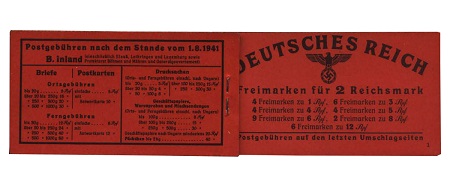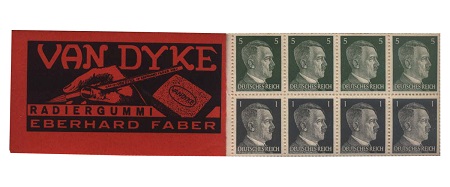
Luftshutz (ARP) matchbox cover.
Had the Nazis intended to create a 'greater reich' or empire, there would have been more attention paid to expanding the economies of the conquered nations. What actually happened was that the Nazis saw the conquered lands as merely warehouses for their own needs and systematically plundered what resources the various nations had. Even back in the first half of the 20th century, few countries were able to operate agricultural systems which were capable of feeding the nation without additional imports and as such, the Germans would circumvent the shortages caused by the British naval blockades by simply taking large quantities of food from the conquered nations, in effect forcing them to pay for their own occupation. Over the course of the war, some 15 million people would be forced into working for the Nazis as little better than slaves.
Complete unissued book of German postage stamps.
The population of Germany in 1939 was roughly double that of Britain; 80 million compared to some 40 million. However, due to the blockade, as well as the lack of the coherent global empire which the British enjoyed, a larger percentage of the overall population was required for agricultural production; consequently, the Germans were very soon forced to look towards the production of artificial materials such as rubber and oil.

As in Britain, rationing was introduced at the very beginning of the war. This was actually a generous allowance, with extra being allocated towards those employed in essential manual war-related professions, such as the steel industry. Hitler, however, had grave concerns over the introduction of rationing, as he was well aware that the popularity of the Nazis in large part rested on the perceived economic miracle that they had to date provided; as such, any move away from this prosperity could potentially have been seen as a retrograde step. Anyone seen as being of a lesser racial group under the Nuremberg race laws, was issued with woefully insufficient rations.

Replica of a German Air Raid Bunker Sign. This advises that the warden in charge and must be obeyed.
German ARP hand cranked air raid siren.
Not everything was subject to rationing, although these tended to be imported items and as such, soon became unavailable, making their exclusion largely academic. Locally-produced vegetables were exempt and in rural areas, much of the daily routine of markets continued as before the war. The cities, however, which were reliant on food being transported from the countryside, felt the effects of the rationing more. Many families began to keep rabbits in order to supplement the rations and it was the children's task to tend these.


To read about the blackout, click here.
To view our collection of German newspapers, please click here.
Back
